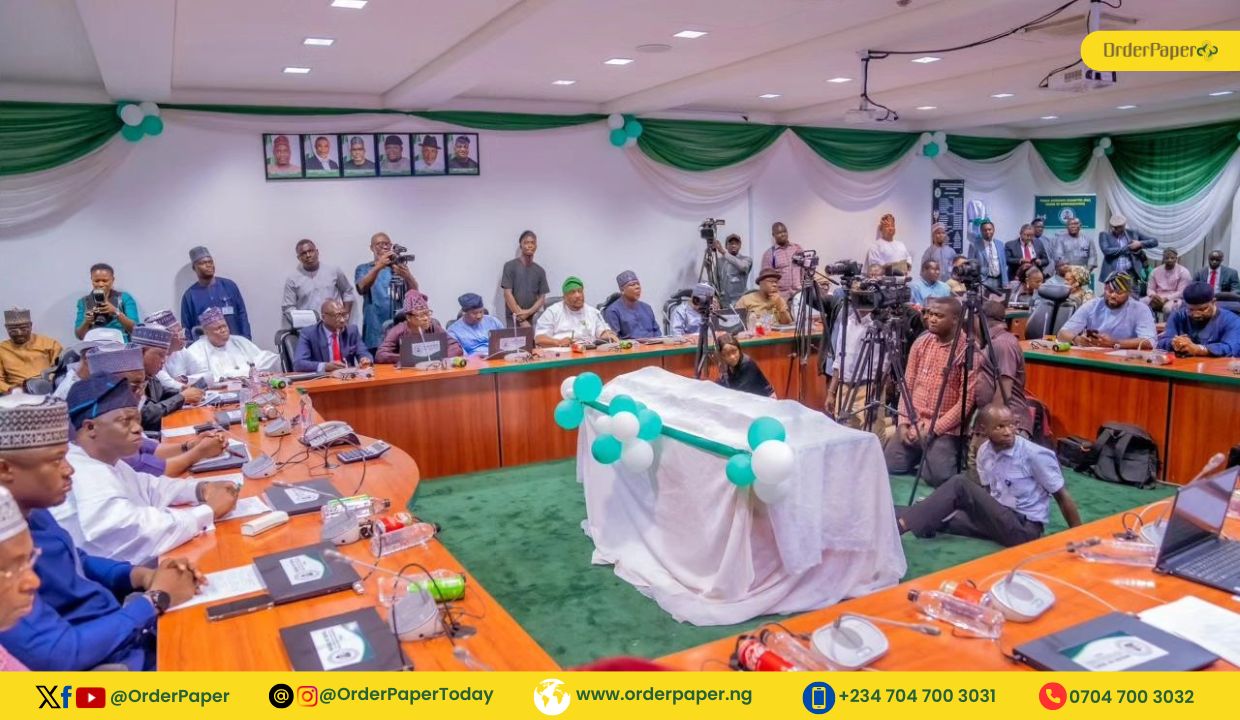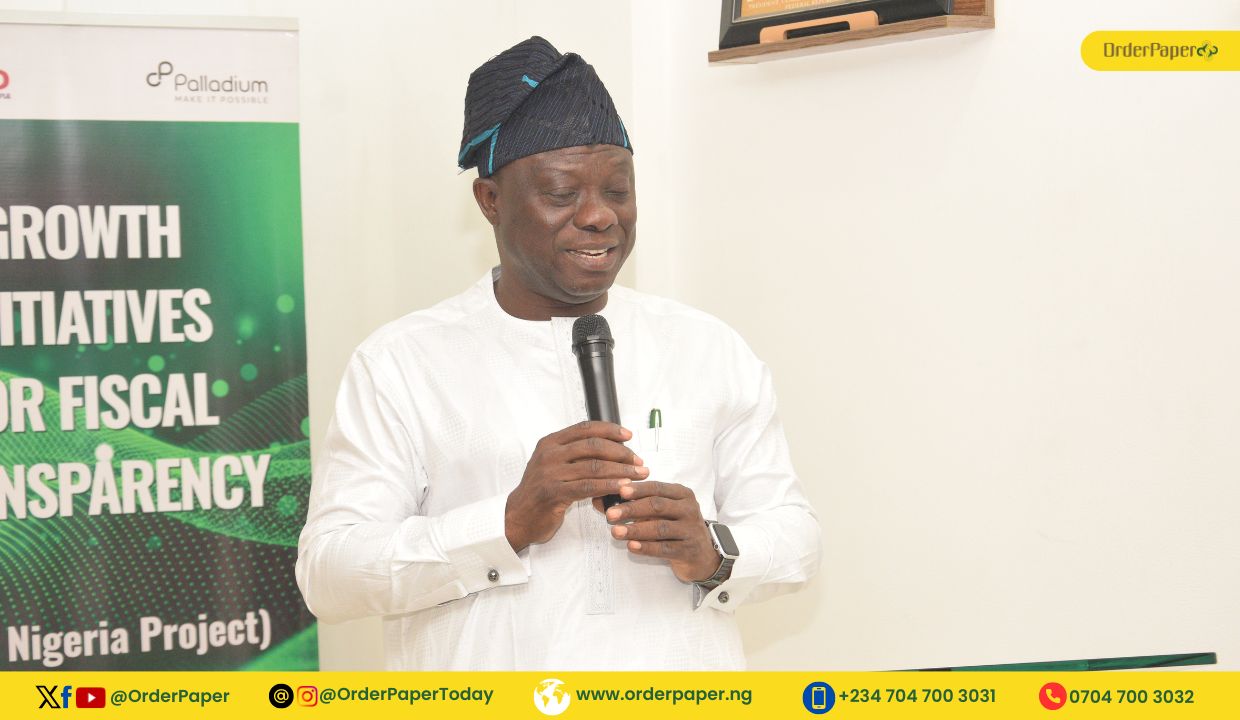
The recently unveiled digitalized hearing room of the public accounts committee (PAC) of the House of Representatives is a landmark.

The unveiling….
On the 15th of July, Speaker of the House of Representatives, Rep. Abbas Tajudeen, unveiled the digitalized Public Accounts Committee (PAC) hearing room and the maiden edition of a news magazine. In his speech, the speaker said incorporating Information and Communication Technology (ICT) into the work of the PAC is “essential for enhanced transparency, efficiency, and accountability in the oversight of public funds,” adding: “advanced digital tools and platforms streamline data analysis, facilitate real-time monitoring, and ensure comprehensive documentation of proceedings, thereby making the oversight process more effective and accessible.” He also revealed that the House will soon commence the process of amending its standing orders to accommodate e-petitions and facilitate the use of ICT in receiving and processing public petitions. He revealed that this transformative step will be the first of its kind in Nigeria and will enable more efficient, transparent, and accessible petition procedures, allowing citizens to engage with the legislative process more effectively.
 On his part, chairman of the committee, Rep. Bamidele Salam noted that this innovation is a significant step forward in the quest to support the 10th House of Representatives’ vision of open parliament through transparency, digitalization, and citizens’ engagement, in line with the legislative agenda. He added that the digitalized hearing room was equipped with digital technologies such as laptops with over 100 resources, unlimited internet facilities, large-screen multimedia, and other technical devices for e-hearing.
On his part, chairman of the committee, Rep. Bamidele Salam noted that this innovation is a significant step forward in the quest to support the 10th House of Representatives’ vision of open parliament through transparency, digitalization, and citizens’ engagement, in line with the legislative agenda. He added that the digitalized hearing room was equipped with digital technologies such as laptops with over 100 resources, unlimited internet facilities, large-screen multimedia, and other technical devices for e-hearing.
The event had the likes of the Accountant-General of the federation, Oluwatoyin Sakirat Madein, Auditor-General of the Federation, Shaakaa Kanyitor Chira, Executive Vice Chairman of the Nigeria Communications Commission (NCC), Dr. Aminu Maida, members of the House of Representatives, and Civil Society Organisations (CSOs), present.
What You Need to Know about the PAC
The Public Accounts Committee of the House of Representatives is established under section 85(5) of the 1999 constitution (as amended) with the responsibility of oversighting the expenditure of public funds, ensuring that government revenues are properly accounted for and that expenditures are made with legislative authorization.
The committee carries out its legislative function through meetings/hearing sessions with Ministries, Departments, and Agencies (MDAs), investigations of referrals from the house resolutions and petitions, and oversight visits to project sites/locations to carry out performance audits.
Another critical role of the PAC is that of influencing legislative reforms where they highlight systemic issues within the public financial management, prompting legislative action to address shortcomings. Through their findings and recommendations, they advocate for policy change and improvement in financial regulations thereby enhancing the overall governance framework.

The 10th House of Representatives’ quest for open parliament through transparency, digitalization, and citizens’ engagement propelled them to digitalize the PAC hearing room as a landmark innovation that marks a significant step forward in discharging their constitutional mandate with greater efficiency and effectiveness.
Benefits of Digitalization
In the modern digital era, efficiency, transparency, and accountability are paramount. Legislative bodies worldwide are increasingly aware that embracing digital transformation can revolutionize governance. The Public Accounts Committee (PAC) of the House of Representatives, a pivotal body overseeing government expenditures, is no exception. Digitalizing the PAC could spearhead fiscal reforms, ensuring that public funds are managed judiciously and transparently. The digitalization of PAC will help in the following specific ways:
- Enhancing Efficiency and Accuracy: The digital systems will help streamline data collection, processing, and analysis, enabling the PAC to scrutinize financial records more effectively, eliminating the traditional paper method.
- Improving Transparency and Accountability: This will help to provide real-time access to financial data, making it easier for the PAC and the general public to track government expenditures, eliminating malpractices.
- Better Data Management and Accessibility: Through digitalization, PAC can securely store and retrieve financial records, audit reports, and other critical documents with cloud storage and blockchain technology.
- Strengthening Collaboration and Communication: Digitalization will boost collaboration and communication within the PAC and with other stakeholders as it will help streamline interactions and ensure that all committee members are on the same page, thereby facilitating faster decision-making and more cohesive policy implementation.
- Adapting to Future Challenges: The fiscal landscape is continually evolving, with new opportunities emerging regularly, a digitalized PAC is better equipped to adapt to these changes.
Conclusion
The digitalization of the Public Accounts Committee of the House of Representatives is not merely a technological upgrade; it is a strategic enabler of fiscal reforms. A digital PAC can ensure that public funds are managed prudently.
